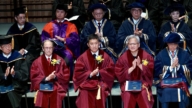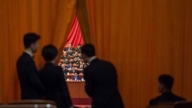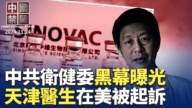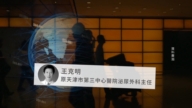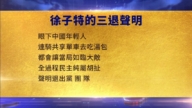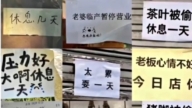【新唐人2014年07月11日讯】7月9号到10号,第六轮“美、中战略与经济对话”,和第五轮“中、美人文交流”高层磋商在北京举行。中方有中共领导人习近平致开幕辞,美方有国务卿克里参与。双方在大量关键问题上各持己见,对这次美、中对话国际媒体评价认为,缺乏实质性的结果。让我们一起去听听专家们的解读。
习近平开幕词的题目是“努力构建中、美新型大国关系”。美国国务卿克里在9号的发言中说:“我认为,新型大国关系不能只靠语言来界定,而是应该由行动来界定。”
习近平在开幕式上首次点明:“中、美对抗对两国和世界肯定是灾难”。
美国杂志《中国事务》总编辑伍凡:“谈了两年没有任何进展,现在反而‘搞对抗变成灾难’了,可见这个问题是向恶化走,不是向正面走。‘灾难’过去从来没有用过。它已经遇到了美国对它施加非常大的压力,它就认为有对抗的可能性了嘛,所以才讲是灾难了。”
这次“美、中战略与经济对话”的重点议题,有货币改革、朝鲜问题和双边投资协定等。
旅美时事评论员蓝述认为,对比前苏联和西方民主国家“针锋相对”的“冷战型”关系,中共现在所热衷的所谓美、中新型大国关系,最大的不同就在于利益上的“你中有我、我中有你”,北京最根本的目地是要维护政权。
旅美时事评论员蓝述:“中共它在价值体系上它不可能和西方谈到一块去,这是毫无疑问。那么在这种情况之下,中共它所谓的新型大国关系,就是通过让利——向西方的国家输送利益。从而让西方国家不在人权、价值问题上去指责中共。它就在很大程度上降低了来自于西方的这些对中共的压力。”
不过,美国官员会后透露,双方在领土主权争议上各持己见。克里认为,中方牺牲区域和谐稳定,来解决领土主权问题,是无法接受的。但中方并不让步。另外,在人民币汇率的问题上,美国财长雅各布•卢表示,人民币汇率由市场决定,这对中国经济发展很重要,而中共副总理汪洋提出,金融改革需要掌握适当速度。
除此之外,中方期待美、中加强反恐合作,加速双边投资条约的谈判﹔美国则希望中国放松管制,让美国公司在华有更公平的竞争环境。
世界媒体大量报导这次会谈。《路透社》评价:“这种年度会谈已经进入第五个年头。至今为止,会谈没有达成多少实质性的协议。”
美国杂志《中国事务》总编辑伍凡看到现在美、中两国,无论在经济、环境、能源和人权等方面,双方都不肯放弃基本利益。他认为,双方做不到超越意识形态的不同,真正结成新型大国关系。
伍凡:“中共不可能放弃它的底限——共产党专政。中共所谓新型大国的关系就是:我的核心力量你不能碰的,这是第一﹔第二我北京想要的你美国一定要给我,不给那就不是新型大国关系。就是‘我的是我的,你的也是我的’。”
美国《彭博新闻社》针对中方所期待的“新型大国关系”说:“这种公开的宣言,跟双方日益戒备彼此的战略意图和战术等各种迹象成对比。”“中国担心欧巴马政府推行外交政策再平衡,将战略重心向亚洲转移,目地是遏制中国在亚太地区日益增长的影响力。”
北京去年11月在有争议的海域上宣布成立“东海防空识别区”,并在南中国海建起石油钻井平台。
《彭博》表示,中共当局认为,中国与日本和菲律宾有海洋权争议的时候,美国偏向它的这两个盟国。
另外,美、中双方的疑虑还包括﹕美国在5月起诉了5名中共军官,指控他们通过电脑网络盗窃美国的商业机密。而中共取消了原定于本周举行的网络安全会议。
采访编辑/唐音 后制/陈建铭
U.S.-China Dialogue Regarding New Relationship Model
he Sixth Round of U.S.-China Strategic and Economic
Dialogue (S&ED) and the Fifth Round of High-Level
Consultation on People-to-People Exchange (CPE)
took place in Beijing on July 9 and 10.
Communist regime leader Xi Jinping delivered the opening
statement with U.S. Secretary of State John Kerry.
The two sides disagreeon a number of key issues.
International media criticized the lack
of substantive dialogue.
Let’s hear the experts’ analyses.
In his opening remarks, Chinese leader Xi Jinping forged
a new bilateral model for China-U.S. relationship.
The U.S. Secretary of State Kerry responded: “I would say
to you that a new model is not defined in words.
It is defined in actions."
“etween China and U.S. will
definitely be a disaster for the two countries and the world."
China Affairs magazine editor-in-chief Chris Wu:
“There has been no progress in talks for two years.
Now he is proposing that the confrontation
will become a disaster.
That shows it’s deteriorating rather than moving forward.
This is the first time ‘disaster’ was mentioned.
The great pressure from the U.S. side is likely to cause
the confrontation. That’s why he’s talking about disaster."
The annual talks were expected to focus on Chinese currency,
maritime disputes, and an investment agreement.
Commentator Lan Su compared the Cold War between
the U.S. and the former Soviet Union to the New Model
between the U.S. and China.
He believes the main difference is Beijing’s fundamental
purpose is to secure the interests of the regime.
Lan Su: “There is no doubt that Communist China’s values
do not fit in with Western values.
The so-called new model is built on providing the economic
advantage to the West so that the West will keep silent
on human rights and value abuse of the Communist regime.
In a way, it largely reduces the pressure on the CCP
coming from the West."
However, the U.S. officials later said the two sides disagreed
on the territorial sovereignty.
Kerry does not believe in solving territory issues
by sacrificing the peace and stability of the region.
But China does not budge.
In addition, Secretary of Treasury Jacob Lew mentioned
that moving to a market-determined exchange rate
will be a crucial step.
However, when it comes to financial reform, Chinese Vice
Premier Wang Yang stated that China has to pace itself.
Xi said China expects increased cooperation regarding
the fight against terror and accelerated negotiation
on a bilateral investment treaty to promptly solve the matter.
The United States wants China to relax control, which would
contribute to more fair play for U.S. companies in China.
Reuters commented, “The annual talks, now in their fifth
year, have yielded few substantive agreements."
Chris Wu does not believe U.S. and China will be able to
bypass their ideological differences and reach this new model
because neither will give up on their fundamental interests
in economy, environment, resources and human rights.
Chris Wu: “The CCP will not give up its bottom line –
the communist dictatorship.
Its so-called new model between the two largest economic
powers is, ‘One, do not touch my core strength;
Two, the U.S. must grant everything Beijing wants.’
That’s what this new model is about,
i.e., everything is mine and my way."
Bloomberg commented on this so-called new model saying,
“Such public pledges contrast with signs of increasing
wariness of each other’s strategic intentions and tactics."
“China is concerned that the Obama administration’s
foreign-policy rebalancing toward Asia is aimed
at thwarting China’s growing influence in the region."
Last fall, China established an air-defense identification zone
and built oil rig in the South China Sea.
Bloomberg added, “China has criticized the U.S. for favoring
Japan and the Philippines over China on maritime territorial
disputes in the South and East China seas."
In addition, “the U.S. in May indicted five Chinese military
officers for computer theft of trade secrets, whereas China
canceled cybersecurity talks due this week."
Interview & Edit/TangYin Post-Production/Chen JianMing


